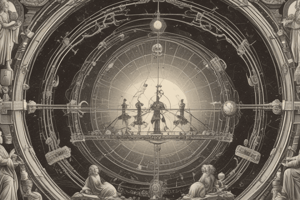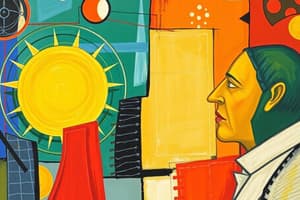Podcast
Questions and Answers
Who supported the geocentric theory of the universe?
Who supported the geocentric theory of the universe?
- Copernicus
- Aristotle (correct)
- Galileo
- Isaac Newton
What is the concept of 'general will' associated with Rousseau's Social Contract theory?
What is the concept of 'general will' associated with Rousseau's Social Contract theory?
- The collective interest of the community. (correct)
- The absolute power of the government.
- The will of a single individual.
- The preferences of the ruling elite.
What major impact did Isaac Newton's world machine have on science?
What major impact did Isaac Newton's world machine have on science?
- It rejected the use of observation and experimentation.
- It promoted the idea of random chaos in the universe.
- It aligned scientific discovery with blind faith.
- It established the universe as a predictable, mechanistic system. (correct)
How did Montesquieu propose to safeguard liberty in government?
How did Montesquieu propose to safeguard liberty in government?
What was unique about Galileo's published works?
What was unique about Galileo's published works?
What was Voltaire primarily advocating for in his works?
What was Voltaire primarily advocating for in his works?
How did Bacon’s scientific method change the approach to studying the universe?
How did Bacon’s scientific method change the approach to studying the universe?
What is rationalism primarily concerned with?
What is rationalism primarily concerned with?
What role did travel literature play in shaping religious views during the Enlightenment?
What role did travel literature play in shaping religious views during the Enlightenment?
What was the primary focus of Diderot's Encyclopédie?
What was the primary focus of Diderot's Encyclopédie?
Why did the scientific revolution contribute to the rise of Enlightenment thought?
Why did the scientific revolution contribute to the rise of Enlightenment thought?
How does Adam Smith's concept of the 'invisible hand' function in a free market?
How does Adam Smith's concept of the 'invisible hand' function in a free market?
What did John Locke argue regarding the social contract?
What did John Locke argue regarding the social contract?
What characterized baroque art in the 18th century compared to its 17th-century origins?
What characterized baroque art in the 18th century compared to its 17th-century origins?
Why did the Catholic Church oppose heliocentrism during the 16th and 17th centuries?
Why did the Catholic Church oppose heliocentrism during the 16th and 17th centuries?
What does Neoclassicism emphasize as an artistic movement?
What does Neoclassicism emphasize as an artistic movement?
Flashcards
Geocentric Theory
Geocentric Theory
The belief that the Earth is the center of the universe.
Heliocentric Theory
Heliocentric Theory
The belief that the Sun is the center of the universe.
Scientific Revolution
Scientific Revolution
A period of great change in scientific thinking.
Enlightenment
Enlightenment
Signup and view all the flashcards
Rationalism
Rationalism
Signup and view all the flashcards
Isaac Newton's Impact
Isaac Newton's Impact
Signup and view all the flashcards
John Locke's Natural Rights
John Locke's Natural Rights
Signup and view all the flashcards
Galileo's Scientific Approach
Galileo's Scientific Approach
Signup and view all the flashcards
Rousseau's Social Contract
Rousseau's Social Contract
Signup and view all the flashcards
Montesquieu's Separation of Powers
Montesquieu's Separation of Powers
Signup and view all the flashcards
Voltaire's Focus
Voltaire's Focus
Signup and view all the flashcards
Adam Smith's Invisible Hand
Adam Smith's Invisible Hand
Signup and view all the flashcards
Rousseau's Emile
Rousseau's Emile
Signup and view all the flashcards
17th-century Salons/Coffeehouses
17th-century Salons/Coffeehouses
Signup and view all the flashcards
Enlightenment Impact on Crime & Punishment
Enlightenment Impact on Crime & Punishment
Signup and view all the flashcards
Neoclassicism
Neoclassicism
Signup and view all the flashcards
Study Notes
Scientific Revolution & Enlightenment
-
Universe Theories:
- Geocentric: Aristotle, Catholic Church
- Heliocentric: Galileo, Copernicus, Kepler
-
Newton's Impact:
- Transformed science, showing the universe as a predictable, mechanistic system, advancing physics and technology.
-
Kant's "Dare to Know":
- Urged courage to understand the universe, even if it challenges established views.
-
Galileo's Works & Fate:
- Combined observation and experimentation, supporting heliocentrism
- Faced trial for heresy and house arrest.
-
Bacon's Scientific Method:
- Emphasized observation, experimentation, and systematic reasoning, replacing reliance on tradition and speculation.
-
Rationalism:
- Belief that reason and logic are primary knowledge sources, not sensory experience.
-
Science vs. Religion (16th-17th Centuries):
- Scientific discoveries (like heliocentrism) challenged religious teachings, prompting reconciliation.
-
Catholic Church's Response:
- Opposed scientific ideas, seeing them as contradicting Scripture and threatening authority during religious upheaval.
-
Scientific Revolution to Enlightenment:
- Scientific emphasis on reason, evidence, and questioning authority inspired Enlightenment thinkers to apply these to society.
Enlightenment Thinkers
-
John Locke (Environment):
- Argued for natural rights (life, liberty, property), social contract, and government by consent; people could overthrow unjust rulers.
-
Rousseau (Social Contract, General Will):
- Social Contract theory: legitimate political authority comes from the general will of the people, requiring individuals to submit for common good, even sacrificing personal interests.
-
Montesquieu (Separation of Powers):
- Advocated separating powers (executive, legislative, judicial) to prevent any branch from becoming too powerful.
-
Voltaire:
- Focused on civil liberties, freedom of speech, religious tolerance, separation of church and state; critiqued inequality and oppression.
Other Enlightenment Concepts
-
Travel Literature & Cultural Relativism:
- Exposed people to diverse beliefs, challenging religious superiority and promoting tolerance.
-
Denis Diderot & Encyclopédie:
- Spread Enlightenment ideas through the widely accessible printing press, promoting reason and secularism.
-
Adam Smith & Wealth of Nations (Invisible Hand):
- Argued individuals pursuing self-interest in a free market (invisible hand) promote public good, leading to economic prosperity.
-
Rousseau & Child Rearing:
- Emphasized natural, child-centered education, shifting from strict discipline to fostering curiosity and emotional development.
-
Salons & Coffeehouses:
- Social spaces for intellectuals to discuss ideas, share knowledge, spreading Enlightenment thought.
-
Baroque to Rococo Art:
- Baroque was dramatic and ornate, Rococo was lighter, more playful, and elegant, reflecting Enlightenment tastes.
-
Neoclassicism:
- Artistic movement reviving classical Greek and Roman styles emphasizing simplicity, order, and rationality.
-
Enlightenment & Crime/Punishment: (This section is incomplete. More information needed from the original text)
Studying That Suits You
Use AI to generate personalized quizzes and flashcards to suit your learning preferences.




